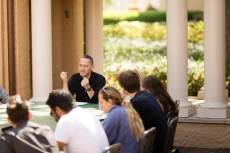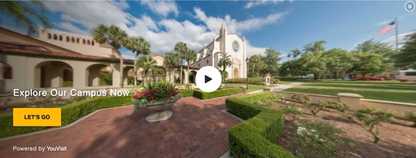Paying It Forward
Highly accomplished environmental lawyer Renee Stone ’85 sits down with Abrielle Mannino ’25 to discuss her biggest takeaways from Rollins, the value of the liberal arts, and insights gleaned on her path to advocacy.
By Abrielle Mannino ’25, as told to Gigi Marino
March 15, 2023

A self-described “Florida girl,” Renee Stone ’85 remembers being enamored by beautiful beaches, swamps, reefs, and coastlines as she was growing up in Fort Lauderdale. But it wasn’t until a Rollins faculty member helped her get an internship at the Audubon Center for Birds of Prey in nearby Maitland that her passion for wildlife preservation grew wings. Stone worked there for three years, earning credit toward her English major and developing a deeper passion for environmental issues. She went on to become a Truman Scholar and Rhodes Scholar; earn a master’s in history from Oxford University and a juris doctorate from Stanford Law; and hold leadership positions in more than a dozen private and public organizations working for environmental protection and conservation. She currently serves as the senior advisor for infrastructure at the National Oceanic & Atmospheric Administration.
Stone recently returned to Rollins to speak about climate change and the value of an interdisciplinary liberal arts education as preparation for tackling the great challenges of our time. While on campus, she connected with budding advocate Abrielle Mannino ’25, who’s double-majoring in philosophy and public policy and political economy and minoring in sustainable development and the environment. She and Stone bonded over a shared experience of safely shepherding sea turtles to their ocean home during mating season as they discussed how Stone’s time at Rollins helped shape her success.

You’ve accomplished so much. How did you go from being an English major to serving in roles like chief of staff at the National Park Service and senior advisor to the secretary of the U.S. Department of Energy? “Rollins magazine did a story on me a few years ago when I won an alumni award, calling me ‘the accidental advocate.’ That’s a good description. I’ve never been a person who’s had a good answer to, ‘What’s your five-year plan?’ I’ve taken opportunities to do different kinds of things and had lots of jobs, kind of wandering from one interesting thing to another. It’s good to have a plan, but you don’t have to follow it. You only have to pick your next step. You don’t have to decide the next 30 years all at once. Jobs can be building blocks, especially early in your career.”
Could you expand on that idea? “There are lots of great ways to make a contribution. You can provide direct services, like cleaning up the beach or the lake or working with injured wildlife. You can help educate people about environmental problems like climate change. When you’ve figured that out you can organize other people to work on the cause, you can get involved in public policy or in politics and have a greater impact on the systems that need to improve. There are many options, especially at a place like Rollins, to grab opportunities to learn, and all you have to do is decide the next step.”
Although you have had many “next steps” in your career, the common thread is protecting our environment. How did you first become interested in conservation? “I got great advice from my first-year advisor at Rollins, sociology professor Arthur Jones, and the career counselor, Wanda Russell, who suggested I intern at the Florida Audubon Society. I worked on their state-wide magazine, helping with layout and production and eventually with some of the writing and photography. Then I got involved with the Audubon Center for Birds of Prey and worked in the education department, which did great work on sea turtles, manatees, and all kinds of birds. I felt like I had found my people and started thinking of the environment as a possible career path.”
Who were your biggest influences here at Rollins? What did you learn from them? “I had several because that’s the kind of place Rollins is. Arthur Jones was just wonderful and helped me deal with freshman anxiety. Wanda Russell helped me understand career options that might apply to English majors and environmentalists and encouraged me to apply for the Rhodes Scholarship. My academic advisor, [English professor] Socky O’Sullivan, taught me how to tell a good story and have a sense of humor, along with how to write and to analyze literature. And I have to mention Thad Seymour, president of the College when I was here. He was a lively, warm, lovely presence on campus. He was a huge cheerleader for the students and really made the college feel like a community.”
You mentioned the Audubon Center. Were there other co-curricular experiences at Rollins that helped define your path forward? “I went to Australia my junior year. I had never been anywhere. I always had this fascination with Australia—it just seemed so exotic and cool and different. I got to go to Tasmania, Melbourne, and the Great Barrier Reef, where I worked on a conservation project for a month tagging sea turtles. In the fall of my senior year, I went to Ireland. The political situation was complicated and volatile and fascinating. And the people were incredible. I made friends on those trips who I still have today.”
What do the liberal arts mean to you? How does this kind of education prepare you to tackle big problems like climate change? “My education at Rollins was broad and deep, a guided tour of a wide range of academic subjects and a deep dive into one discipline—that’s what the liberal arts mean to me. You learn a little about a lot of things, so you can understand how philosophy and physics bump up against each other and how music and math are connected. And you go deep into your major, so you can fully understand the richness and complexity of the subject. In the process, you learn how to approach a topic, develop options, and solve problems. You also learn teamwork, how to communicate, how to persevere. Those are skills you have forever—and those are the skills we need to solve the big problems in the world.”
As you know, I’m passionate about policy and the environment as well and really want to make a difference. What advice do you have for those of us who want to follow a path similar to yours? “Communication is incredibly important. You need to be able to put sentences together and convey ideas on paper and in person. And you’ve got to find your own niche, whether it’s the law, science, advocacy, policy, academics, whatever. A good way to find your niche is to try different things like public sector, private sector, or nonprofit. Law isn’t for everybody, but it’s been a terrific path for me. I’ve practiced law for about half of my career, but it’s also a good foundation for policy and management roles.”
You give generously of your time to Rollins. What motivates you to do so? “In hindsight, I know how lucky I was to have landed at Rollins. My parents didn’t go to college, and the whole thing was mysterious and intimidating to me. I applied because one of my high school teachers was a Rollins alum and she encouraged me to apply because she thought I would thrive here. She was right. I needed the support and attention that I got from my professors and advisors at Rollins. They helped me work through the mysteries and growing pains. That changed the whole trajectory of my life. People here care about you and want you to succeed. It makes me happy to try to pay that back in some small way. Sometimes the world can make you cynical, but I come to campus and see the enthusiasm, creativity, and passion young people have—it’s an antidote to cynicism.”
- Categories:
- English |
- Mentorship |
- Philosophy |
- Public Policy and Political Economy

See for Yourself
Get a feel for Rollins’ unique brand of engaged learning and personalized attention through one of our virtual or in-person visit experiences.
Take a Closer LookRecent Stories
December 16, 2025
From Rollins to Broadway
Juan Carlos ’23, who plays Bob Newby in the Broadway production of Stranger Things: The First Shadow, returned to campus to share what he’s learned on his journey from Rollins to theatre’s biggest stage.
December 15, 2025
Video: Rollins College Sneak Peek
From lakeside classrooms to vibrant student spaces, see where curiosity, community, and opportunity come together.
December 15, 2025
What It’s Like ... to Plan One of the World’s Biggest Events
Fueled by the endurance and adaptability she built at Rollins, Morgan Colley ’17 is helping bring the 2026 FIFA World Cup to life on the world’s biggest stage.

